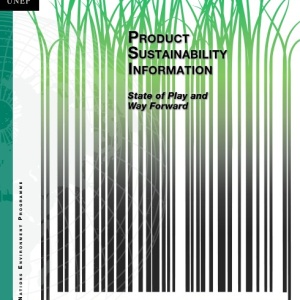
Unsustainable patterns of consumption and production threaten global development and environmental well-being. Ensuring sustainable consumption and production should take a life cycle approach, and central to this is the development of product sustainability information (PSI).
This publication provides four key recommendations in order to advance a coherent and context-relevant use of PSI that is useful for consumer decision-making:
1. Provide a global guidance for inter-operability of PSI tools (their development and use), and manage concerns over trade barriers while reducing uncertainty in the information that the tools produce. This can be done under the umbrella of the Consumer Information Programme under the 10 Year Framework of Programmes.
2. Encourage major PSI actors, i.e. label and tools associations to use life cycle based principles as criteria for the alignment of their work.
3. Facilitate the inclusion and engagement of representatives of developing and emerging economies in international efforts on PSI.
4. Create an international dialogue between brand owners, retailers, consumer organisations and policymakers in order to acknowledge the different cultures and contexts to develop a better understanding of what consumers will recognise to be information that is credible upon which they can act.
Citation
UNEP Life Cycle Initiative, Product Sustainability Information: State of Play and Way Forward, ISBN: 978-92-807-3478
Download the publication here.
You can read more about product sustainability information in food labelling category in the Research Library. There is also an overarching Theory methods and tools category which for example includes keyword categories Certification schemes, Standards and Life Cycle Assessment.







Post a new comment »